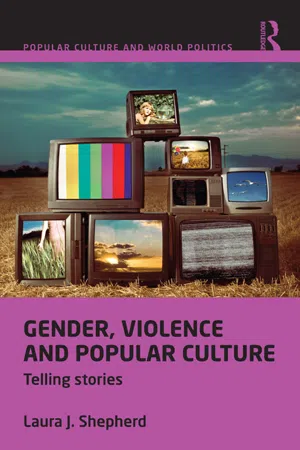Gender, Violence and Popular Culture
This book examines the intersection of gender and violence in popular culture. Drawing on the latest thinking in critical international relations, media and cultural studies and gender studies, it focuses in particular on a number of popular TV shows, including Angel, Buffy the Vampire Slayer, Firefly, Generation Kill, The Corner and The West Wing.
The book makes a unique theoretical contribution to the ‘narrative turn’ in International Relations (IR) by illustrating the ways in which popular culture and global politics are intertwined and how we make sense of our worlds through these two frames. Methodologically, the book enhances discourse-theoretical analysis in IR through its incorporation of methods from narratology and film studies. The book proposes an aesthetic ethicopolitical approach to global politics which challenges us to interrogate how it becomes possible that we think what we think, it challenges the truths that we hold to be self-evident and that which we take to be common sense. It demands that we think carefully, critically, uncomfortably, about our world(s) – even when we’re ‘only’ watching television.
Laura J. Shepherd is a Senior Lecturer in International Relations at the University of New South Wales, Australia. Laura’s research focuses on gender politics, including feminist theory and feminist International Relations theory, as well as security in theory and policy discourse and the politics of representation.
Popular Culture and World Politics
Edited by Matt Davies, Newcastle University, Kyle Grayson, Newcastle
University, Simon Philpott, Newcastle University, Christina Rowley, Bristol
University, and Jutta Weldes, Bristol University
The Popular Culture World Politics (PCWP) book series is the forum for leading interdisciplinary research that explores the profound and diverse interconnections between popular culture and world politics. It aims to bring further innovation, rigor, and recognition to this emerging sub-field of international relations.
To these ends, the PCWP series is interested in various themes, from the juxta-position of cultural artefacts that are increasingly global in scope and regional, local and domestic forms of production, distribution and consumption; to the confrontations between cultural life and global political, social, and economic forces; to the new or emergent forms of politics that result from the rescaling or internationalization of popular culture.
Similarly, the series provides a venue for work that explores the effects of new technologies and new media on established practices of representation and the making of political meaning. It encourages engagement with popular culture as a means for contesting powerful narratives of particular events and political settlements as well as explorations of the ways that popular culture informs mainstream political discourse. The series promotes investigation into how popular culture contributes to changing perceptions of time, space, scale, identity, and participation while establishing the outer limits of what is popularly understood as ‘political’ or ‘cultural’.
In addition to film, television, literature, and art, the series actively encourages research into diverse artefacts including sound, music, food cultures, gaming, design, architecture, programming, leisure, sport, fandom and celebrity. The series is fiercely pluralist in its approaches to the study of popular culture and world politics and is interested in the past, present, and future cultural dimensions of hegemony, resistance and power.
Gender, Violence and Popular Culture
Telling stories
Laura J. Shepherd
Aesthetic Modernism and Masculinity in Fascist Italy
John Champagne
First published 2013
by Routledge
2 Park Square, Milton Park, Abingdon, Oxon, OX14 4RN
Simultaneously published in the USA and Canada
by Routledge
605 Third Avenue, New York, NY 10017
Routledge is an imprint of the Taylor & Francis Group, an informa business
© 2013 Laura J. Shepherd
The right of Laura J. Shepherd to be identified as the author of the editorial material, and of the authors for their individual chapters, has been asserted in accordance with sections 77 and 78 of the Copyright, Designs and Patents Act 1988.
All rights reserved. No part of this book may be reprinted or reproduced or utilised in any form or by any electronic, mechanical, or other means, now known or hereafter invented, including photocopying and recording, or in any information storage or retrieval system, without permission in writing from the publishers.
Trademark notice: Product or corporate names may be trademarks or registered trademarks, and are used only for identification and explanation without intent to infringe.
British Library Cataloguing in Publication Data
A catalogue record for this book is available from the British Library
Library of Congress Cataloging in Publication Data
Shepherd, Laura J.
Gender, violence and popular culture : telling stories / Laura J. Shepherd.
p. cm. – (Popular culture and world politics)
Includes bibliographical references and index.
1. Sex role on television. 2. Women on television. 3. Violence on television.
4. Popular culture–United States–History–20th century. I. Title.
PN1992.8.S44S54 2012
791.45’6521–dc23
2012003989
ISBN: 978-0-415-51795-9 (hbk)
ISBN: 978-0-415-52591-6 (pbk)
ISBN: 978-0-203-10503-0 (ebk)
DOI: 10.4324/9780203105030
Typeset in Bembo
by Taylor & Francis Books

